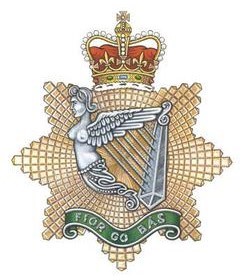| Irish Regiment of Canada | |
|---|---|
 Regimental badge | |
| Active | 1915–present |
| Country | Canada |
| Branch | Canadian Army |
| Type | Line Infantry |
| Role | Light Infantry |
| Size | One battalion |
| Part of | 33 Canadian Brigade Group |
| Garrison/HQ | Sudbury, Ontario |
| Motto | Fíor go bás (Irish for 'faithful until death') |
| March | "Garry Owen" |
| Engagements | |
| Battle honours | See #Battle honours |
| Commanders | |
| Colonel-in-chief | Charles III |
| Insignia | |
| Headdress | Caubeen |
| Tartan | O'Saffron |
The Irish Regiment of Canada is a Primary Reserve infantry regiment of the Canadian Army based in Sudbury, Ontario. It is part of the 4th Canadian Division's 33 Canadian Brigade Group. Currently one battalion of the regiment exists.
Contents
- Lineage
- Irish Regiment of Canada
- The 1st Machine Gun Battalion, CMGC
- The 58th (Sudbury) Field Artillery Regiment, RCA
- The 173rd Field Battery, RCA
- The 174th Field Battery, RCA
- The 175th Field Battery, RCA
- Lineage chart
- Perpetuations
- The Great War
- Operational history
- The Great War 2
- The Second World War
- Afghanistan
- Alliances
- Battle honours
- Irish Regiment of Canada Regimental Museum
- Order of precedence
- Media
- Notable members
- See also
- References
- External links
The Irish regiment was founded in 1915 with headquarters in Toronto. The modern incarnation was formed in Sudbury in 1965 by the conversion of the 58th Field Artillery Regiment, RCA, which became 2nd Battalion, Irish Regiment of Canada. At the same time, the original battalion in Toronto was reduced to nil strength and placed on the Supplementary Order of Battle as the 1st Battalion, The Irish Regiment of Canada. [1] [2]
In 1931 they became the only kilted Irish Regiment in the world with the adoption of their unique tartan often called "O'Saffron" [3] designed by Thomas Gordon Ltd. of Glasgow. (Irish regiments in the British Army utilize kilted pipers wearing a solid-coloured saffron kilt.) [4] They also share the caubeen headdress common to other Irish regiments. The badge and hackle are worn above the right eye, with the left side of the caubeen pulled down – the opposite of the way berets are worn. [5]


